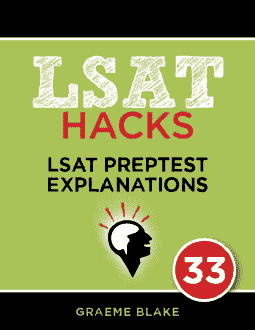QUESTION TEXT: A recent national study of the trash discarded in…
QUESTION TYPE: Strengthen
CONCLUSION: Plastics do less harm to the environment than paper does.
REASONING: Plastics make up a smaller portion of trash than paper (whether measured by weight or by volume.) The damage that a given amount of trash does is about the same whether the trash is paper or plastic.
ANALYSIS: The argument focuses only on the harm done by paper and plastic garbage. But there are other ways that materials can harm the environment. The correct answer shows that paper manufacturing is worse than plastic manufacturing.
___________
- This doesn’t matter. The stimulus was measuring volume of paper after it was in the trash. So this doesn’t affect the measurements.
- Popular opinion is pretty irrelevant in most cases. We care about what is actually and verifiably true.
- This wouldn’t affect anything. The comparison was entirely between paper and plastics. The author wasn’t claiming that plastics were the least harmful of any pollutant or that paper was the most harmful.
- CORRECT. This offers an additional reason that paper is more environmentally harmful.
- We could already assume this was true. But overall we know that more trash is paper. The areas surveyed were representative of the entire nation.


The use of plastics requires their production. That’s why D is on point.
It’s a common myth that you should ignore all outside information on the LSAT. This isn’t true! You want to consider LSAT questions as a reasonable human.
ANY human considering the question “Is the use of paper products more harmful than plastics” would consider the harm cause in production, use, and waste disposal. You need to consider the full life cycle to consider the harm. This is just common sense, and literally ZERO people would disagree if you asked them about it. So it’s safe for you to assume you need to consider all elements of the use cycle.
In other words, you’ve made a spurious distinction.
Are you talking about E on question 5 or 6? E on question 6 is a very weak answer that we could already assume to be likely true.
Graeme,
I am still in disagreement with the answer to this question even after hearing the reasoning. My reasoning is that the conclusion is actually not “Plastics do less harm to the environment than paper does.” it is that “the USE of Plastics do less harm to the environment than paper does.”
Answer E fails to address the USE of either paper or plastics; while answer A, even though irrelevant to the arguments support, is the only answer that address the USE of paper (even though it does this loosely – talking about the time between manufacturing and discarding which is the time when something would be considered “used”).
I get that this is a strengthen question, so outside information can be brought into the answer, like in this instance, the manufacturing of paper/plastic… and as I just typed that i realized that this is how answer E is justified.. damn. This test sucks